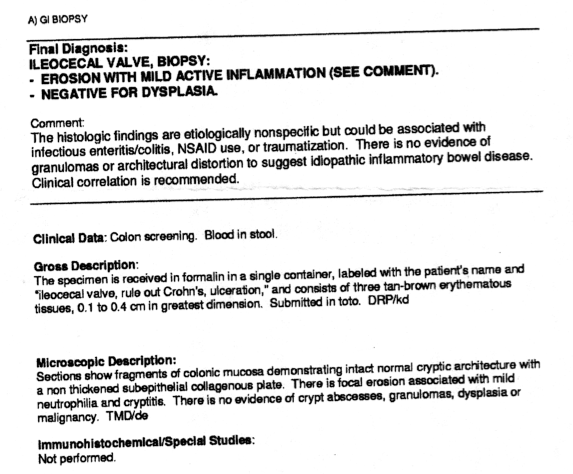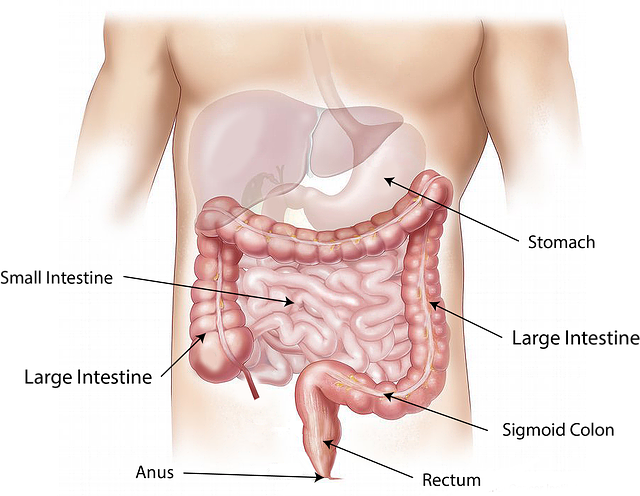6 Tips for Your First Visit With a Gastroenterologist
To prepare you for your first visit with a gastroenterologist, here are my hard-learned tips. I have had first visits with three of them, so I have paid my dues.
I recommend these tips whether you are seeing a gastroenterologist for the first time ever or if you're having a first visit with another gastroenterologist.
Also see How to Talk to Your Doctor (Gastroenterologist or Otherwise).
Tip #1: Mentally Prepare Yourself for Your First Visit With a Gastroenterologist

Before your first visit with a gastroenterologist, meditate or engage in some kind of relaxing activity. It is best to be calm and clear-headed during your appointment.
If you get nervous anyway, that's okay. Just be present with the nervousness. As you sit (or pace) in the waiting room, bring your attention to where you feel that nervousness in your body. Bring your breath there. For at least three breaths, taken slowly and deeply, hold your attention on the sensations you feel.
Most people feel nervousness in their belly, but some might notice shallow chest breathing, foot tapping, fist clenching, or some other behavior. Don't force yourself to stop whatever you're doing (unless you're being disruptive to other people!). Just watch what you're doing, feel the sensations it creates, and bring your breath to the area or areas that are expressing the nervousness.
When I'm nervous, I also find it helpful to ground myself by placing my attention on my feet, legs, and hips. Affirmations I silently say to myself are “Mother Earth supports me all the time. I sink into the support of Mother Earth.” I literally feel my body sink into her comforting support, which naturally releases some of my bodily tension.
Tip #2: Arrive Early for Your Appointment
In the interest of remaining calm and clear-headed, arrive early for your appointment. Rushing around to try to be on time creates unneeded stress. Of course, being late can get you off to a bad start with the gastroenterologist and his or her staff.
For your first visit with a gastroenterologist, expect to fill out forms, unless you received them beforehand and can complete them at home. Allow extra time if you will fill them out in the waiting room.
Tip #3: Come Prepared With a Written List of Questions, Concerns, Symptoms, and Goals

Bring with you a written list of questions and concerns that you have. Also jot down all of your current symptoms—digestive and otherwise. Digestive dysfunction often causes symptoms outside of the gastrointestinal (GI) tract.
For example, headaches and brain fog are common symptoms of non-celiac gluten sensitivity.
Up front, state your goals, including your goals with your digestive health and with the partnership you hope to create with the gastroenterologist.
Tip #4: Bring Any Relevant Test Results With You
For example, for your first visit with a gastroenterologist, you can bring test results for:
- Food allergy (IgE) testing
- Food sensitivity testing (IgG, ALCAT, Mediator Release Test, and others)
- Stool tests
- Any previous GI procedures (colonoscopy, endoscopy, gastric emptying scan, etc.)
- Breath tests for small intestine bacterial overgrowth (SIBO), lactose intolerance, and others
- Any recent and/or relevant blood tests (including any previous celiac disease testing)
Also, where applicable, bring pathology reports and clinical data with you. One of my gastroenterologists gave me short summaries of my results, but not the data behind the summaries. You want it all. Your new gastroenterologist wants it all.
The truth is, doctors are human like the rest of us, and they miss things—even important things. Maybe you or your next doctor will discover what's missing and take action accordingly.
For example, in his summary of my colonoscopy and endoscopy results, my second gastroenterologist neglected to mention two potentially important findings that the pathologist noted in his clinical report: that he couldn't rule out Crohn's disease in my lower small intestine and that I might have a disorder called eosinophilic esophagitis.
Nor did this doctor tell me anything about these findings during my follow-up appointment. I was not happy when I realized these omissions—which didn't happen until I was preparing to move out of state and requested a copy of my medical records from his office.
Example of a Pathology Report From My First Colonoscopy
At 47, I wasn't yet “of age” for my first colorectal screening. However, my family doctor ordered the colonoscopy because I had found blood in my stool. It was time for my first visit with a gastroenterologist.
My first visit was relatively brief. My gastroenterologist took my medical history and examined me. Nothing hurt—even after she pressed deeply into my abdomen multiple times. We scheduled the procedure.
During the procedure, she found a single large ulcer at my ileocecal value (where the small and large intestines meet). I was terrified that I might have an autoimmune disease called Crohn's disease. My uncle died from complications of this disease at age 49. He had been diagnosed with it in his early 20s.
Fortunately, the pathologist saw no evidence of Crohn's disease in my biopsy (tissue sample) of that ulcer.
Although my gastroenterologist couldn't be certain, she suspected that the cause of the ulcer was the over-the-counter (OTC) non-steroidal anti-inflammatory drugs (NSAIDs) I took for menstrual cramps. I have not taken a single dose of an NSAID since.
And I know from my second colonoscopy five years later that THE ULCER IS GONE.
I should mention that I had taken prescription-strength NSAIDs from ages 30–37 during a disabling repetitive strain injury (RSI) to my hands. At the time, I had no idea these drugs could damage my digestive health.
I did not receive this pathology report until years later when I requested a complete copy of my medical records from the gastroenterologist's office. Nothing important was missed this time.
Truly, it is best to receive a copy of all pathology reports, along with any doctor summaries. Both serve their purpose and are necessary. If these reports aren't offered to you (and they probably won't be), ask for them.
The following image contains the “meat” of the pathology report from my first colonoscopy.
 Pathology Report for the Biopsy of My Ileocecal Valve
Pathology Report for the Biopsy of My Ileocecal ValveTip #5: Don't Be Surprised If Your New Gastroenterologist Wants to “Scope” You
At your first visit with a gastroenterologist, you might learn that at your next visit, this doctor will want to perform a colonoscopy and/or an endoscopy procedure—even if you had such testing done not that long ago.
This happened to me. I was shocked, completely unprepared for this possibility, during my first visit with my third gastroenterologist. My previous colonoscopy and endoscopy had been performed less than two years before.
My husband, Tim, worked for many years as a foreign car and truck mechanic. As he describes it, “Sometimes, a customer comes to you with a mechanical problem and says that the previous mechanic already checked something, and it wasn't the problem. That customer doesn't expect you to check that again. But as the new mechanic, you can't really trust what the guy before you did. You have to do your own troubleshooting from start to finish.”
Gastroenterologists are not unlike mechanics in this regard.
Note that if your doctor deems that these procedures are medically necessary—despite the earlier-than-expected timing—your health insurance will most likely cover them.
Tip #6: If You Intend to Propose a Test or Treatment, Arm Yourself With Knowledge

During your first visit with a gastroenterologist, you might want to sit back and see what steps he or she suggests you take next. This might especially be the case if you are seeing a gastroenterologist for the very first time.
However, you might have some of your own ideas in mind. If you do, here are a few suggestions.
If you would like to propose a particular diagnostic test or treatment option, bring printed materials about the test or treatment option with you. Offer to leave a copy of these materials for your doctor.
In my experience, conventional medical doctors tend to disrespect naturopaths—which I find immensely frustrating. Because of that, in your attempts to convince your doctor to order a test or consider a treatment option, it would be ideal if you could find material from sources that are more “acceptable” and familiar to medical doctors.
Examples of such sources include peer-reviewed medical journals or material from another MD, such as Mark Hyman or Alessio Fasano. Dr. Hyman is a well-respected functional medicine practitioner. Dr. Fasano is a widely published pediatric gastroenterologist who is an expert in celiac disease and other gluten-related disorders.
CeliacFAQ.com home page > Articles > 6 Tips for Your First Visit With a Gastroenterologist


